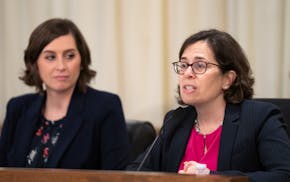Opinion editor's note: Star Tribune Opinion publishes a mix of national and local commentaries online and in print each day. To contribute, click here.
•••
Career capstones don't get much sweeter than the one Michael Noble of the advocacy group Fresh Energy has experienced in the last few weeks.
For more than 30 years, Noble's professional mission has been to tell this state's policymakers that climate change is real, it's human-made, and it will be catastrophic unless humankind does two things as quickly as possible:
Get all of the carbon out of the electricity supply, then electrify everything we can.
Noble had a few good years — 1994, 2007, 2013 — in which short-lived majorities of this state's elected officials paid him heed. But there were a lot of other years of doubt, disinterest, disinformation and partisan stalemate. When he decided sometime last year that he would step down in mid-2023 as Fresh Energy's executive director, Noble had no assurance that a climate-change breakthrough was at hand at the Legislature.
As I've observed even when my topic isn't global warming: Typically, government change is glacially slow. But sometimes, abruptly, an ice sheet collapses and falls into the sea.
That metaphor doesn't seem too strong for the big-deal energy bill Gov. Tim Walz signed into law last week. It requires that by 2040, Minnesota's utilities must generate 100% of the electricity they sell from carbon-free sources — that is wind, solar, hydro, nuclear and maybe some geothermal.
That's ambitious, Noble concedes. But given the technology that's already developed — and declining in cost — plus the energy-tech developments on the horizon, it's also doable, he assured me last week.
And while he lamented — as I do — that it took party-line votes in both the House and Senate to pass the "100 Percent by 2040" bill, he's convinced the changes it brings will be long-lived, even if this session's DFL majorities are not.
"One hundred percent clean energy will be so popular that it will never be repealed," he predicted. "Once policymakers set the North Star, all the utilities will be responsive. They have to be. They are accountable to the Public Utilities Commission."
He noted that not a single Minnesota utility was screaming "No way!" as the bill moved through the House and Senate. Utility lobbyists worked with the bill's sponsors and secured amendments that would slow the pace of transition for electric cooperatives and allow for the granting of exceptions in extraordinary circumstances.
By the time the bills reached the House and Senate floors, all the state's utilities either supported them or remained neutral. Their positions undercut GOP legislators' efforts to hang the moniker "Blackout Bill" on the legislation.
"Why would the utilities support a bill that produces blackouts?" Noble asked.
I've got other questions: Why would Republicans unanimously resist a clean energy bill that Minnesota's power providers like? Whose interests are they serving?
And what will Republicans do next to protect those interests? Folks, brace yourselves. If the wearing of masks and obtaining of vaccinations could be demonized as woke symbolism while a global pandemic raged, what manner of political tempest is coming for Americans who put solar panels on their roofs?
In the next few years, the climate protection cause is going to need leaders who make the case that enduring a political tempest now and then is the price of democracy — and the price of keeping the planet habitable.
So now is when you're retiring, Michael Noble?
Not retiring, he says. "Rewiring." As he leaves Fresh Energy, he expects to find new ways to work on the climate issue. He urges his fellow baby boomers from all walks of life to do the same.
"We don't have the same stake in this issue that our children do," he said. "But we have the advantage of being seasoned veterans. We know how the system works. Our job is to support our children as they demand climate action."
He said his generational peers sometimes ask, "What can we do?" He had a ready answer:
"Go ahead, change your light bulbs or buy an EV. That's fine. But it's much more important now to be engaged in civic life. Better to make sure that your state legislator knows your name, knows your face and knows that you care about the climate."
One more thing: Check out Third Act, a climate-and-civics advocacy organization founded by journalist Bill McKibben. It's designed to channel the change-making power of the boomer generation.
That power may be slowly ebbing, but I agree with Noble: It still has a long way to run.
Lori Sturdevant is a retired editorial writer for the Star Tribune. She is at lsturdevant@startribune.com.

Olson's cheers and jeers: When OLA speaks, it's best we listen
Opinion: The unjust detention of Doğukan Günaydın
Dabney: This 420 is going to be lit

